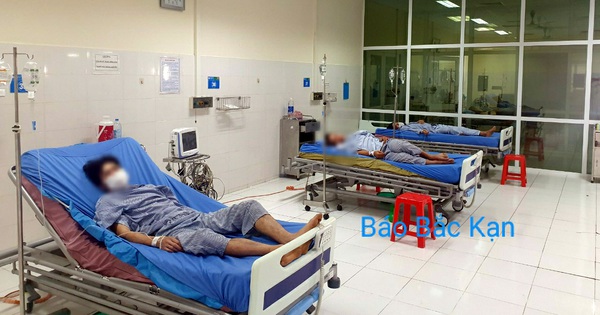So the cause? cancer What is colorectal cancer, signs of disease, treatment and prevention? We need to learn the necessary information about colorectal cancer to know how to prevent, detect it early and treat it promptly.
1. What is colorectal cancer?
Colorectal cancer is cancer that originates in the colon (the main part of the large intestine) or the rectum (the junction between the colon and anus). This type of cancer is common in both men and women.
Most colon cancers begin from growths in the lining of the colon called polyps. The ability to progress to cancer depends on the nature of the polyp, the size of the polyp, the number of polyps. Therefore, colonoscopy, detection and removal of polyps helps to reduce the risk of cancer.
Many domestic studies show that colorectal cancer is most common in middle-aged people (40-60 years old), but recently the disease is tending to be younger with many cases of colorectal cancer in women. 18-20 years old, especially in the case of 12 years old.

MSc.BS Nguyen Ngoc Dan – High-Tech Center – Saint Paul Hospital, Lecturer in Foreign Affairs – Hanoi Medical University
Colorectal cancer is one of the most common cancers in the world and a leading cause of cancer death overall. In Vietnam, the disease ranks third after lung cancer and breast cancer (in women).
In Vietnam, on average, there are 13 cases of this disease for every 100,000 people. The disease tends to increase due to eating problems (unhealthy eating habits, contaminated food…)
2. Who is at risk for colorectal cancer?
– Colorectal cancer is common in people over 50 years old, overweight and obese people, eat a lot of red meat, processed meat, etc.
– Unhealthy lifestyle such as physical inactivity, smoking, drinking a lot of alcohol are risk factors that increase the likelihood of cancer.
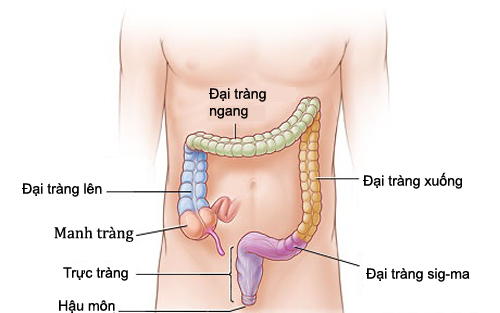
In terms of age, young people can develop colorectal cancer, but the risk increases more markedly after the age of 50.
People with a family history of colorectal cancer or adenomatous polyps are also at increased risk.
In addition, patients with a history of inflammatory bowel disease, such as ulcerative colitis or Crohn’s disease, have an inherited syndrome (approximately 5% to 10% of people with colorectal cancer inherit a genetic defect (mutation in genes) can cause familial cancer syndromes and predispose these people to the disease.
3. How is the diagnosis?
Colonoscopy: It is the most important test when colorectal cancer is suspected. Through endoscopy, the doctor can know the relative position and size of the tumor and take a biopsy sample to confirm that the tumor is cancerous or not.
In addition, patients need to be carried out some other imaging and tests such as: computed tomography (CT-Scan), abdominal ultrasound, chest X-ray, electrocardiogram, blood test… to help diagnose Accurately diagnose the stage to get the right treatment
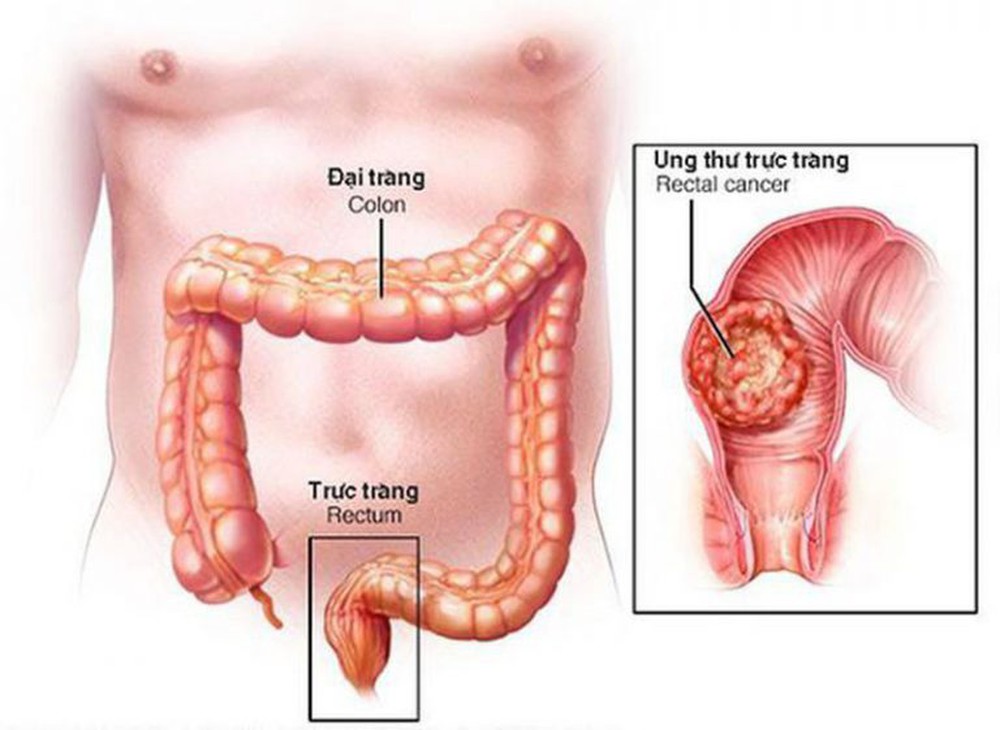
Colorectal cancer images.
4. Stages of the disease
State 1: Stage 1 colorectal cancer means that the tumor is only in the inner layer of the colon or rectum and has not invaded through the wall of the colon or rectum. Cancer at this stage has a better chance of being cured with surgery.
Phase 2: At this stage the tumor has grown deeper into the wall than in stage I and can grow into nearby tissue.
Some stage 2 colon cancers have a high risk of recurrence. Tumors that are removed surgically will be examined in a laboratory to help your doctor predict your risk of recurrence. If the cancer has a high risk of recurrence, your doctor may recommend chemotherapy after surgery. Radiation therapy may be used to try to kill any remaining cancer cells.
Stage 3: Stage 3 colorectal cancer means the cancer has spread to the lymph nodes. The risk of the cancer coming back is very high.
Stage 4: In the late stages, the cancer has spread to another part of the body, such as the liver or bones. This spread is called distant metastasis.
Stage 4 with metastatic cancer is virtually incurable. Chemotherapy is given to patients at this stage to control symptoms and prolong survival.
5. Treatment of colorectal cancer
The treatment of colorectal cancer is mainly based on the stage (extent) of the disease, but other factors are also important. Patients with colorectal cancer that have not spread to distant sites often undergo surgery as the primary or first line of treatment.
Surgery is the most basic treatment, the tumor must be removed at the same time as the metastatic lymph nodes.
MSc.BS. Nguyen Ngoc Dan said that in the past, surgery was performed by open incision, but today less invasive surgery is increasingly being developed such as laparoscopic surgery, surgery through natural holes. Due to many advantages such as small scar, less pain, patients recover early, on the other hand, the results for oncology are similar to open surgery.
Supportive treatment: including chemotherapy and radiation therapy, can be applied before or after surgery, depending on each specific disease case.
Chemotherapy is the use of drugs to kill cancer cells, by stopping the cancer cells’ ability to grow and divide. Systemic chemotherapy drugs enter the bloodstream to cancer cells throughout the body.
Chemotherapy may be given after surgery to remove any remaining cancer cells. For some patients with colorectal cancer, radiation and chemotherapy are given before surgery to reduce the size of the tumor in the rectum and reduce the risk of the cancer coming back.
Radiation therapy is a cancer treatment that uses high-energy X-rays or other radiation to kill cancer cells. Radiation therapy is often indicated for advanced rectal cancer cases.
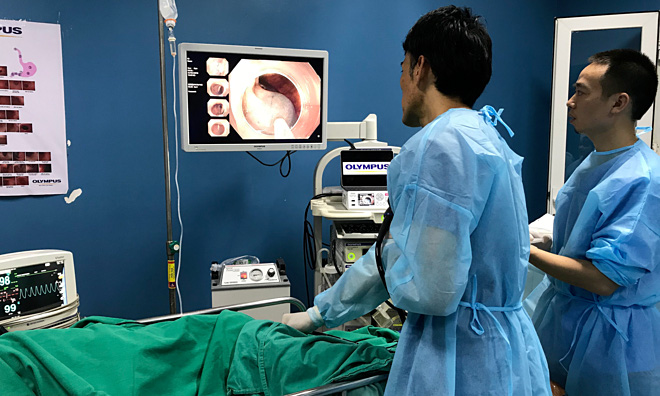
Endoscopic resection of colon tumors.
The outcome of colorectal cancer treatment depends mainly on the stage of the disease. If diagnosed when the cancer is at an early stage or is still a benign polyp, surgery can cure it completely. In contrast, when the disease is at a late stage and has metastasized, the 5-year survival rate is only about 5-10%.
Therefore, colorectal cancer screening is extremely meaningful, helping to diagnose early and save patients’ lives.
6. Screening for early detection of colorectal cancer
Colorectal cancer in the early stages often has no symptoms or vague symptoms, easy to confuse with other diseases. Therefore, to be able to detect it at an early stage, people need to actively go for regular health check-ups, screen for early detection of disease, especially for those at risk of disease.
Colorectal cancer is more common in older adults, so it’s common to screen people 50 years of age or older. Some people have risk factors that increase their chances of getting colorectal cancer at a young age. Therefore, it is important to screen for colorectal cancer at a young age if: Have ever had colorectal cancer or have polyps; Having a family member with colorectal cancer or polyps; Have ulcerative colitis or Crohn’s disease; Hereditary colon cancer syndrome…
There are three methods commonly used to screen for colorectal cancer.
Fecal occult blood test: The test has a sensitivity of about 70-80% to detect cancer. However, this is a non-specific test, meaning that being positive does not necessarily mean colorectal cancer but possibly another disease in the digestive tract. Once blood is detected in the stool, the patient will be indicated for a colonoscopy.
Virtual colonoscopy: Using multi-slice CT-Scan to perform on patients who have had bowel resection. The computer will reconstruct the lumen of the colon. This method can detect most polyps and tumors in the colon and rectum. After virtual colonoscopy detects polyps, a real colonoscopy is required to remove polyps, and biopsy the tumor for a definitive diagnosis.
Colonoscopy: It is the most effective method in colorectal cancer screening. Colonoscopy can visualize the rectum, colonic framework, and part of the terminal colon. Detect colon cancer with high sensitivity and specificity. During endoscopy, it is possible to evaluate lesions, biopsies, and remove polyps from early cancerous lesions.
Through colonoscopy, the doctor will detect diseases such as hemorrhoids, polyps, ulcerative colitis… from there, appropriate treatment such as removing polyps during colonoscopy and biopsy of polyps to diagnose identify cancer.
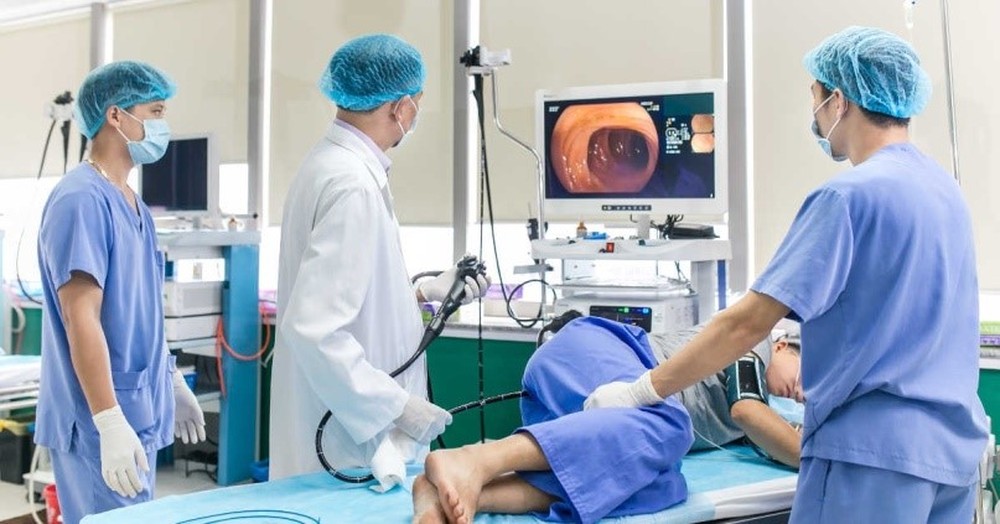
Colonoscopy.
7. Prevention of colorectal cancer
To prevent and reduce the risk of colorectal cancer, we need to have a reasonable and moderate lifestyle. Increase physical activity such as regular exercise, avoid overweight and obesity.
It is especially important to have a healthy, balanced diet. Specifically:
Reduce fat in your diet Limit red and processed meat Limit foods high in salt, fermented foods, smoked. Increase the intake of green vegetables and fruits Avoid genetic mutations such as pesticide residues, herbicides, and weight gain stimulants in food. Do not abuse alcohol, beer and stimulants Do not smoke
Screening colonoscopy to detect and remove polyps: Because colon cancer mainly comes from polyps. Therefore, endoscopic polypectomy reduces the risk of colorectal cancer.
Cases that need colonoscopy to screen for polyps include:
– People aged 50 years and over.
– People with a family history (parents or siblings with colorectal cancer or polyps with a high risk of colon cancer under 60 years of age) need a colonoscopy at age 40 or before 10 years of age. with the youngest people with cancer or polyps at high risk of cancerous growth.
– People who have had emergency colorectal cancer surgery such as bowel obstruction who have not previously had a colonoscopy need colonoscopy 3 to 6 months after surgery.
– Patients who had a full colonoscopy before colorectal cancer resection should have a repeat colonoscopy after 1 year. If the results are normal, a second scan will be performed after 3 years. If the results are still normal, re-test every 5 years.
at Blogtuan.info – Source: Soha.vn – Read the original article here



